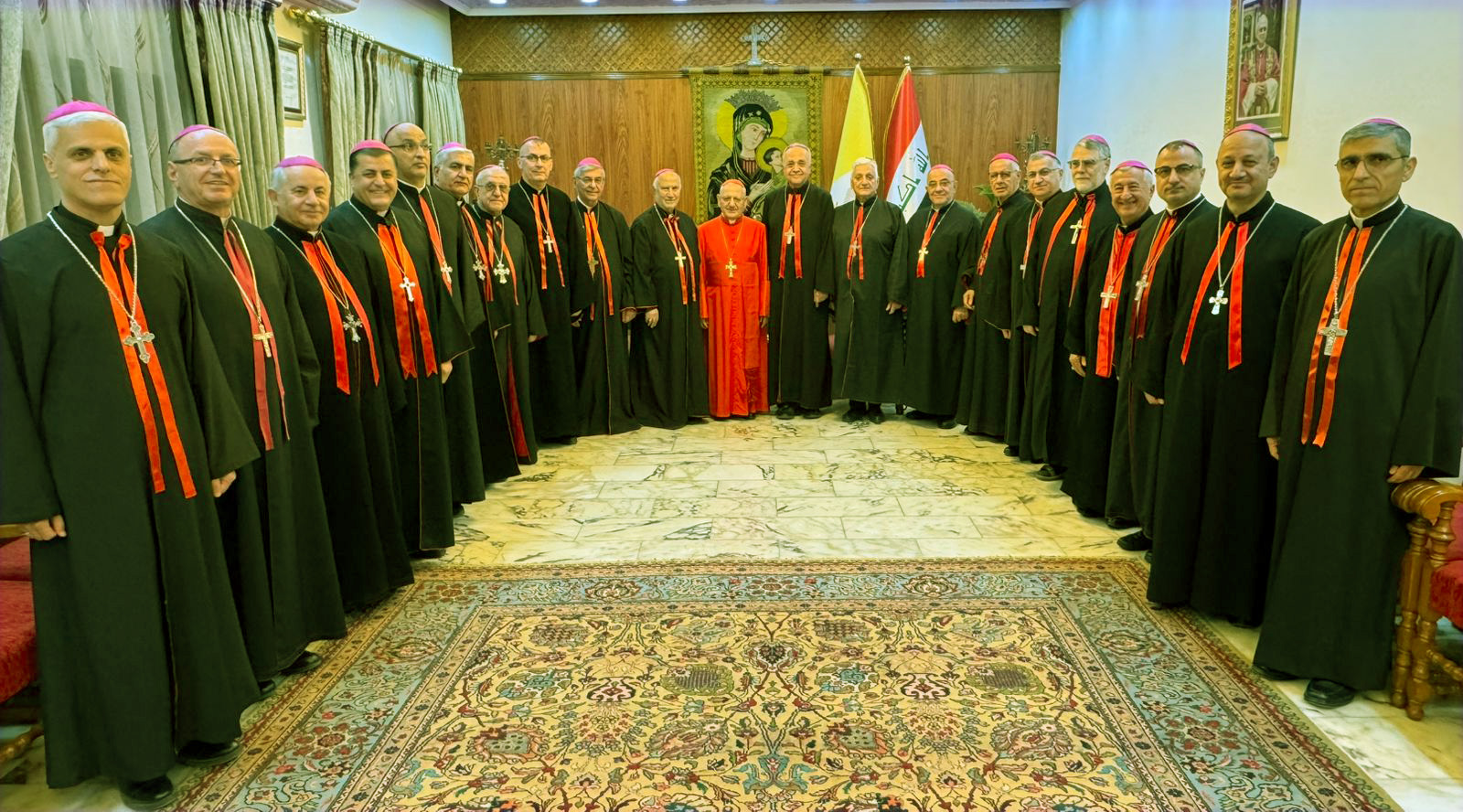Chaldean Synod: A “new government” for Iraq and safeguarding the “future of Christians”
The annual ordinary session of the Iraqi Church, led by Cardinal Sako and attended by 20 bishops, was held in Baghdad. The final declaration emphasised the importance of “team spirit” in order to put past divisions behind them. A warning to respect “quotas” to protect their presence in institutions.
Baghdad (AsiaNews) - The formation of a new government for Iraq after the parliamentary elections on 11 November, the future of Christians who still suffer from the denial of their rights and the emigration emergency, combined with concern about conflicts in the Middle East.
These are the points at the centre of the annual ordinary session of the Chaldean Synod, scheduled from 17 to 22 November at the patriarchal headquarters in the Mansour district of Baghdad, outlined in the final statement sent to AsiaNews on the eve of the conclusion of the proceedings.
Under the chairmanship of the Chaldean primate, Cardinal Louis Raphael Sako, 20 bishops gathered with the sole exception of emeritus bishops Ibrahim Ibrahim, Gabriel Kassab and Shlemon Warduni, confirming a renewed unity that puts an end to a period of internal criticism within the episcopate.
The proceedings, the note emphasises, took place in an atmosphere of ‘harmony’ and ‘spirit of responsibility,’ starting with a request for ‘paternal blessing’ sent in a letter to Pope Leo XIV to better respond to the ‘material, moral and spiritual needs of the people.’
On the subject of domestic policy, the Synod calls for ‘unity and sovereignty,’ as well as the promotion of the ‘concept of citizenship,’ ‘peace and stability, law, justice and equality,’ which are priorities that the next executive will have to address.
Rapid international changes, conflicts and wars in the Middle East and around the world remain a source of ‘concern,’ as does ‘the suffering of Christians.’ Hence the call for ‘concrete measures to ensure respect for their rights, to treat them as citizens with equal rights in terms of representation and employment, and to use their skills for progress.’ And the first step, the Chaldean bishops warn, is to respect ‘the quota system’ that was established precisely to ‘preserve Christian representation.’
The Synod then outlined some guidelines on which to base future work: first and foremost, work based on ‘team spirit’ to serve the Church and overcome the internal tensions of the recent past, with a view to “unity” in mission; then there is the call for ‘liturgical renewal’ to adapt it to ‘cultural and social changes’ in the spirit of the Second Vatican Council; finally, the call for “ecumenical dialogue with sister Churches” in the face of a “common destiny” according to the principle of “openness, listening, cooperation and respect”.
Finally, Patriarch Sako and the Chaldean bishops outlined some “specific decisions”, including: support for patriarchal institutions such as the seminary, Babel College and educational institutions; protecting children from harassment and abuse; continuing the theme of the beatification of Chaldean martyrs and saints; strengthening the role of the Chaldean Church in dialogue with Islam to consolidate the values of reconciliation, peace and coexistence and preserve the Chaldean heritage, archaeological sites and manuscripts, as well as the possibility of establishing a Chaldean centre or museum; A final point looks to the future, recalling the importance of choosing ‘new bishops for the Church’.
At the opening of the proceedings, Cardinal Sako recalled the importance of ‘respecting the decisions of the Synod and finding effective means to implement them in the dioceses as a sign of episcopal unity’.
The Chaldean primate then focused on the crisis of vocations, which is not due to ‘the absence of young people willing to give themselves’ but rather to ‘the toxic atmosphere that dominates them through social media.
They often suffer from psychological instability, but criticism among the clergy does not encourage them either.’ Hence the call to bishops to work for the proper ‘maturation of young people.’
Among the negative notes mentioned by the cardinal were the work and calls for “unity” among the various Churches in Iraq, which ‘have so far been unsuccessful due to the loyalty of some churches to political parties and the fear of others of seeing their influence reduced.’
Extending his analysis to politics, the cardinal concluded by emphasising that ‘the Church's goal is to enlighten consciences on issues that affect people's lives in terms of their dignity and fundamental rights. It denounces injustice and calls for the application of the law, the concept of citizenship and the achievement of peace and security. That is what we have done and what we are doing.’
05/02/2022 09:48
26/07/2024 12:31
08/07/2024 13:57







.png)










